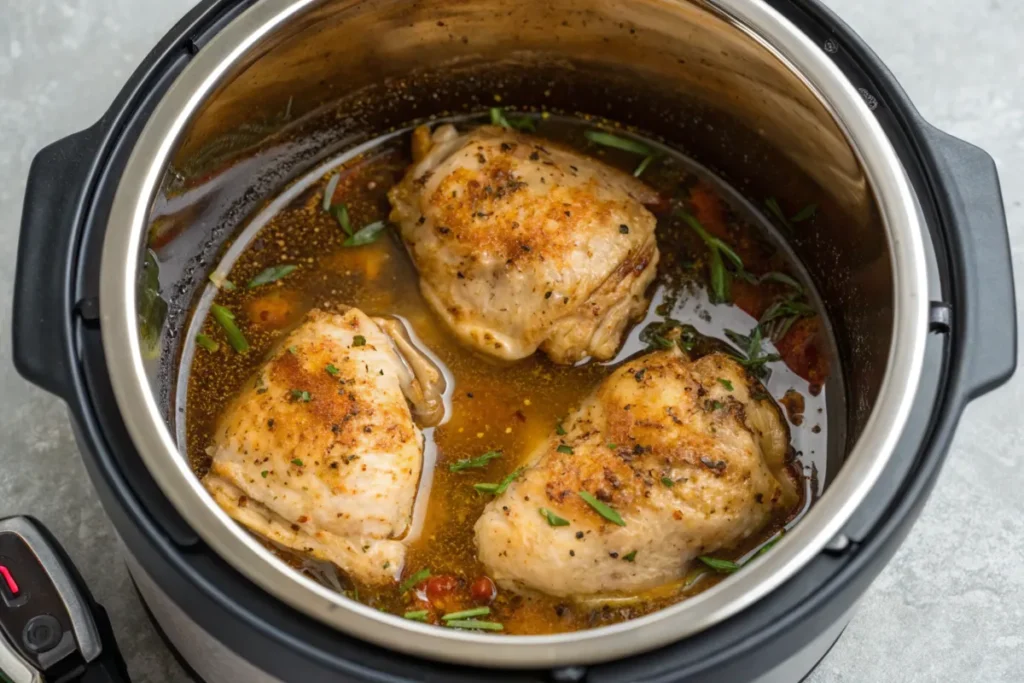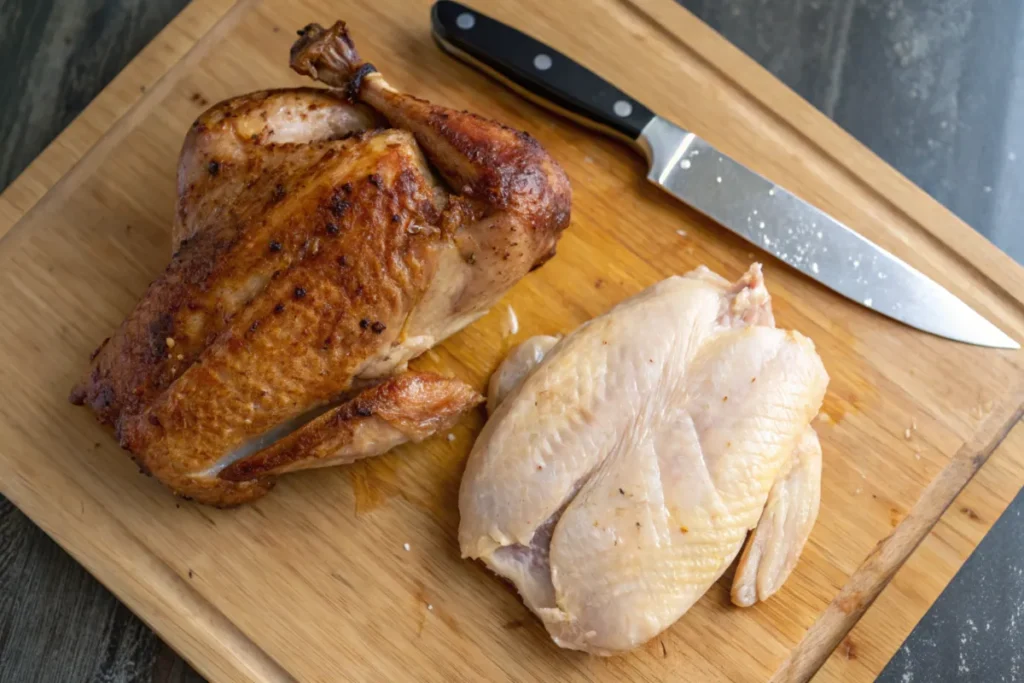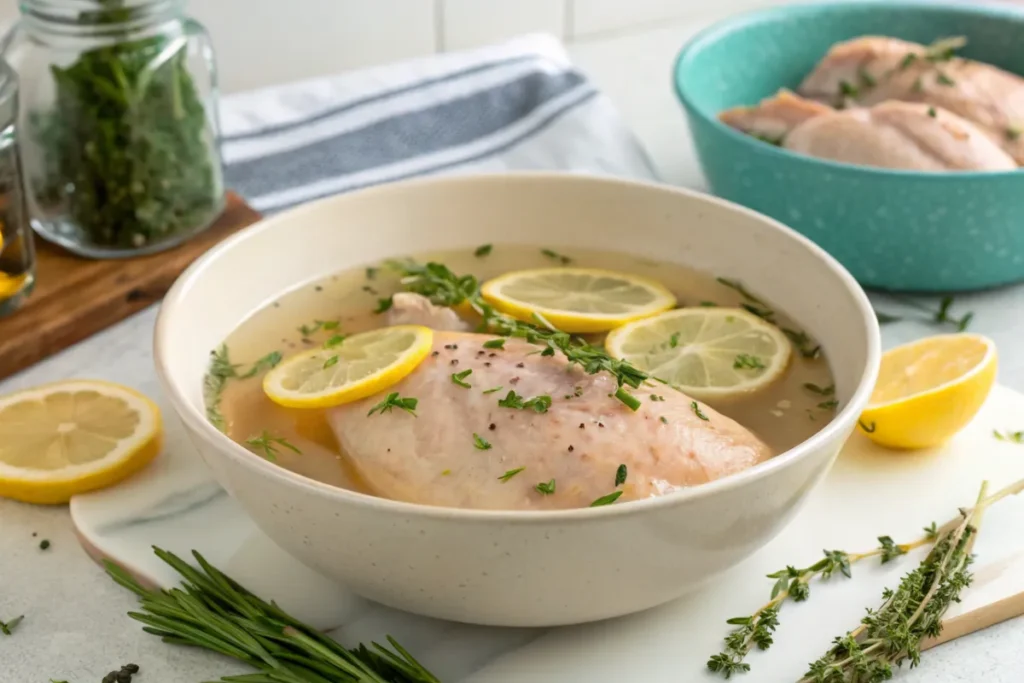Does Chicken Get More Tender the Longer You Pressure Cook It?
When it comes to cooking chicken, achieving the perfect level of tenderness can be tricky. Pressure cooking has become a go-to method for many because it’s fast and often results in juicy, tender meat. But the question remains: Does chicken get more tender the longer you pressure cook it? Some believe extended cooking times lead to more tender results, while others argue it can make the chicken dry and stringy.
In this article, we’ll explore the science behind pressure cooking, discuss factors that influence tenderness, and uncover best practices for perfectly cooked chicken. Whether you’re a beginner or a seasoned cook, this guide will help you master the art of tender pressure-cooked chicken.
How Pressure Cooking Affects Chicken Tenderness
Does Chicken Get More Tender the Longer You Pressure Cook It?
Pressure cooking uses a combination of high heat and steam to cook food quickly. Unlike traditional methods, the sealed environment of a pressure cooker raises the boiling point of water, allowing food to cook faster while retaining moisture. This method is particularly effective for tougher cuts of meat, as the pressure breaks down collagen into gelatin, making the meat tender.
However, chicken is different. While pressure cooking can make it tender, cooking it for too long can lead to overcooked, dry meat. This happens because chicken lacks the dense connective tissues found in tougher cuts like beef brisket, which benefit from extended cooking. Understanding this distinction is key to avoiding the mistake of overcooking your chicken.
How Pressure and Steam Break Down Chicken Fibers
When chicken cooks, heat breaks down the proteins in its muscle fibers, causing them to contract and expel moisture. Initially, this process results in juicy, tender meat. However, if the cooking time stretches too long, the proteins tighten excessively, squeezing out too much moisture and making the chicken dry and tough.
The steam in a pressure cooker helps counteract some of this effect by surrounding the meat with moisture, but it can only do so much. The trick is to find the sweet spot where the chicken is perfectly tender but not overcooked.
In the next section, we’ll dive into the factors that influence chicken tenderness and how to adjust your pressure-cooking technique for different cuts of chicken. Stay tuned to learn more!

Factors That Impact Pressure-Cooked Chicken Tenderness
Cooking Times and Why Overcooking Chicken Makes It Tough
Cooking time is a crucial factor in achieving perfectly tender chicken in a pressure cooker. Many wonder, “Does chicken get more tender the longer you pressure cook it?” While pressure cooking breaks down proteins and collagen effectively, overcooking can lead to dryness and a rubbery texture.
Different cuts of chicken require varying cooking times. For instance:
- Chicken breasts: Cook for 8–10 minutes for tender, juicy results.
- Chicken thighs: Require about 10–12 minutes, as they contain more connective tissue.
- Whole chicken: Needs 25–30 minutes for even cooking.
Exceeding these recommended times may cause the meat to lose its natural juices, making it chewy instead of soft. Using a quick-release method after cooking also prevents overcooking, preserving the chicken’s tenderness.
Choosing the Best Chicken Cuts for Pressure Cooking
The type and quality of chicken you choose can also impact the results. Fresh, high-quality chicken will generally perform better under pressure than frozen or pre-brined options. Bone-in, skin-on cuts retain moisture better than boneless, skinless pieces, which can dry out faster.
Uniformly sized cuts ensure even cooking, preventing smaller pieces from overcooking while larger ones remain underdone. Before starting, consider brining or marinating the chicken for added moisture and flavor. These small adjustments can make a significant difference in the final texture.
For more recipe inspiration, check out Instant Pot Buffalo Chicken for a flavorful twist on tender chicken.
Myths About Tender Chicken in a Pressure Cooker
Why Longer Pressure Cooking Doesn’t Always Mean More Tender Chicken
It’s a common belief that cooking chicken longer in a pressure cooker always makes it more tender. However, this isn’t entirely true. Chicken doesn’t have the dense connective tissue found in tougher meats, so prolonged cooking can actually harm its texture. Instead of becoming tender, overcooked chicken may turn stringy or mushy.
The secret lies in balancing cooking time with the type of chicken you’re using. Shorter cooking times at the right pressure setting ensure the chicken is tender without losing its natural juiciness.
Can You Overcook Chicken in a Pressure Cooker?
Yes, you can overcook chicken in a pressure cooker. Signs of overcooked chicken include dryness, a tough or rubbery texture, and shredded meat that falls apart too easily. To avoid this, stick to the recommended cooking times for each cut and use the pressure cooker’s manual settings to control the process.
Learning the nuances of pressure cooking helps you avoid these pitfalls and ensures your chicken comes out perfectly every time.

Tips for Juicy and Tender Chicken in a Pressure Cooker
Best Pressure and Timing Settings for Tender Chicken
One of the most effective ways to achieve tender chicken is by carefully controlling pressure and cooking time. Many people ask, “Does chicken get more tender the longer you pressure cook it?” While extended cooking may soften tough meats, chicken requires a more precise approach.
High pressure works best for tougher cuts like thighs or drumsticks, as it breaks down collagen faster. For delicate cuts like chicken breasts, low pressure is a better option to avoid overcooking. Always refer to the pressure cooker manual for guidance on timing and settings based on the cut and weight of your chicken.
Here’s a quick guide:
- Bone-in thighs: 10–12 minutes on high pressure.
- Chicken breasts: 8–10 minutes on low pressure.
- Whole chicken: 25–30 minutes on high pressure.
To ensure your chicken remains juicy, use the natural release method for most cuts or quick release for time-sensitive recipes.
Prepping Chicken for Even Cooking
Proper preparation can significantly enhance the tenderness of your chicken. Start by trimming excess fat and ensuring all pieces are similar in size for even cooking. For added flavor and moisture, consider brining your chicken in a saltwater solution for at least 30 minutes before cooking.
Seasoning also plays a crucial role. Rub the chicken with your favorite spices or marinate it in citrus-based mixtures to tenderize the meat.
If you’re looking to elevate your pressure-cooked chicken, try this Buffalo Chicken Instant Pot recipe. The combination of bold flavors and perfectly tender chicken is a crowd-pleaser.

FAQs About Pressure-Cooked Chicken
Does Pressure Cooking Chicken Longer Make It More Tender?
The answer depends on the type of chicken and how long you cook it. While pressure cooking does tenderize chicken quickly, longer cooking times can lead to dryness, especially for cuts like breasts. Stick to recommended cooking times and avoid assuming that longer equals better.
Does Pressure Cooker Make Chicken Soft?
Yes, a pressure cooker makes chicken soft by breaking down its proteins and connective tissues faster than traditional methods. However, controlling the cooking time is key to ensuring the chicken stays tender and doesn’t become overcooked.
Will Cooking Chicken Longer Make It More Tender?
For cuts like thighs or drumsticks, a slightly extended cooking time can enhance tenderness. However, delicate cuts like breasts may lose their texture if overcooked. Always adjust cooking times based on the cut of chicken and the results you want to achieve.
Can You Overcook Chicken in a Pressure Cooker?
Absolutely. Overcooked chicken in a pressure cooker often becomes dry, stringy, or mushy. To prevent this, use a timer and follow recipes designed for pressure cooking.
Comparing Pressure Cooking to Other Methods
Pressure Cooking vs. Slow Cooking for Tender Chicken
When it comes to cooking tender chicken, pressure cooking and slow cooking each have their strengths. Pressure cooking excels at speed. It rapidly breaks down proteins and connective tissues, making it ideal for achieving tender chicken in a fraction of the time. This makes it perfect for busy days or last-minute meal prep.
On the other hand, slow cooking uses low, steady heat over several hours to achieve similar results. The slow process allows flavors to develop deeply, making it a great option for soups, stews, or shredded chicken recipes. However, this method takes considerably longer and requires more planning.
If you’ve ever wondered, “Does chicken get more tender the longer you pressure cook it?”, it’s worth noting that slow cooking provides more control over tenderness for delicate recipes, while pressure cooking is better suited for faster results.
Pressure Cooking vs. Traditional Roasting or Grilling
Traditional methods like roasting or grilling rely on dry heat, which can deliver crispy skin and caramelized flavors. However, these methods can sometimes leave chicken dry if overcooked, especially for lean cuts like breasts.
In contrast, pressure cooking traps steam, locking in moisture and tenderizing the meat. It’s a great choice when you prioritize tenderness over texture. For a balanced approach, consider combining methods—for instance, pressure-cooking the chicken first and finishing it under a broiler for a crispy exterior.
Troubleshooting Common Issues in Pressure-Cooked Chicken
Why Is My Chicken Dry After Pressure Cooking?
One of the most common complaints about pressure-cooked chicken is dryness. This usually happens when the chicken is overcooked or cooked at the wrong pressure setting. If you’re asking yourself, “Does chicken get more tender the longer you pressure cook it?”, remember that extended cooking times can extract too much moisture, leaving the meat stringy and dry.
To avoid this, always use a timer and follow recommended cooking times for each cut. For instance, chicken breasts need less time than thighs. Additionally, using a natural pressure release instead of a quick release can help the chicken retain its moisture by allowing the steam to settle gradually.
How Can I Fix Overcooked Chicken?
If your chicken turns out overcooked, don’t despair! Shredding the meat and mixing it with a flavorful sauce can help salvage the texture. For example, toss shredded chicken with barbecue sauce or creamy gravy for a quick fix. These options make overcooked chicken more palatable while adding moisture.
Another option is to incorporate the chicken into soups or casseroles, where it can absorb additional liquids and flavors. For more creative ideas, check out recipes on Top Fast Recipes for inspiration.
Conclusion and Final Tips for Tender Chicken
Key Takeaways for Pressure Cooking Chicken
Pressure cooking is a powerful tool for creating tender, flavorful chicken. However, achieving perfect results requires understanding the balance between cooking time and pressure settings. Overcooking can lead to dry, stringy chicken, while undercooking may leave it tough.
The answer to “Does chicken get more tender the longer you pressure cook it?” lies in adjusting the method to suit the cut of chicken and your desired outcome. Follow recommended cooking times, experiment with brining and seasoning, and use natural release methods to preserve moisture.
Final Thoughts and Encouragement to Experiment
Cooking chicken in a pressure cooker is as much an art as it is a science. Don’t be afraid to experiment with different cuts, marinades, and techniques to find what works best for you. Whether you’re making a quick weeknight meal or preparing chicken for a crowd, mastering these tips will help you serve tender, juicy chicken every time.
For more creative recipes, check out other dishes on Top Fast Recipes to expand your culinary repertoire!
